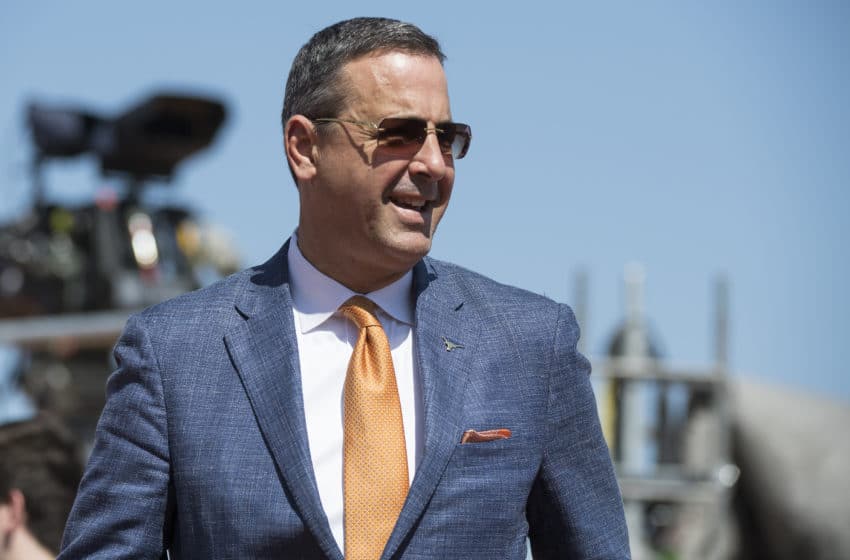The Eyes of Texas Are Upon Us

An interview with Chris Del Conte, athletics director at the University of Texas
By most accounts, Chris Del Conte has revitalized Longhorn athletics. Since his hire in December 2017 as vice president and athletics director at the University of Texas, he’s not only overseen a record-breaking $219 million in annual revenue—he’s also led the charge on building new sports facilities, amped up game day with a festival concept on Bevo Boulevard, and found time to run one of the most responsive Twitter accounts out there. (Seriously, try tweeting at him. He’ll probably respond.) We recently spoke to Del Conte about leading an organization that entertains millions of spectators even as it prepares its student-athletes for success—on and off the field
Texas CEO Magazine: To start off, can you give us an idea of the scope of UT Athletics?
Del Conte: We’ve got about 400 full-time employees, 2,000 part-time employees, 523 student-athletes, and a budget of $225 million. We’re the front porch of an institution that has 52,000 students and about 500,000 living alumni. Plus, there’s about 30 million people in the state of Texas that the University of Texas represents on a daily basis. The eyes of Texas are upon us!
Texas CEO Magazine: You ran smaller operations before you got to the University of Texas. What were the big differences moving to a larger institution?
Del Conte: I’ll go back to the movie Hoosiers for a moment. When I was director of athletics at Rice, it was a lot like the town of Hickory, Indiana, in Hoosiers. It was a small town, 3,000 students, and you have basically 30,000 living alumni and an $11 million budget. You know who your constituents are. When I moved to TCU, it was like the sectionals in Hoosiers. It was a bigger stage, where you have 8,000 students and 50,000 living alumni. And now I’m at the University of Texas, with a lot more than that. But at the end of the day, the fundamentals of the game are the same. It’s still a 10-foot rim, it’s still a 15-foot free throw, and it’s still a 94-foot court.
At the end of Hoosiers, they take the whole team into that big gymnasium and they’re all looking around at the size and scope of the place. But the dimensions of the court are the same as anywhere else. In the same way, the football field is the same at Rice as it is at TCU as it is at the University of Texas. It’s just the size and scope of the operation that’s bigger. With that comes all the challenges of a larger organization, but the basic footprint is the same. And in all three institutions, we’re educating young people, helping them get a degree through their interests on the playing field. It’s just the size and scope of who you represent and the complexities of the institution that are magnified when you move to a larger institution.

Texas CEO Magazine: Finding good jobs for your student-athletes is a key priority of yours. What do you want Texas CEOs to know about your student-athletes?
Del Conte: When they come to our school, every one of our student-athletes believes that they’re going to be a pro athlete in whatever sport they participate in. But there’s always that “aha” moment where they realize it’s about more than that. Our job is to say, “A sport is what you do—it’s not who you are.” When you come to college, we’re going to find and accentuate who you are. Every one of our kids has tremendous grit. They are driven to be the very best. They have put their entire efforts into athletics and they know what time management is, they know what hard work is. The American dream of bettering one’s life is always predicated on education. That’s exactly the opportunity we’re offering at the University of Texas. We’re getting young people to come change the world.
That’s what we say here: “What starts here changes the world.” We truly believe that. When you get a degree from the University of Texas, from the finest faculty the land has to offer, you are then prepared to change the dynamics of any institution you go work for based on that educational background at the University of Texas. So, an employer getting a student-athlete from the University of Texas can be sure that person has been tested under the eyes of Texas. The pressure of being a student athlete is not for the faint of heart. There’s a saying in our weight room: “The pride and winning tradition of the Texas Longhorns will not be entrusted to the weak nor the timid.” Tell me what employers would not want to hire someone who’s been trained under that motto?
That’s what we say here: “What starts here changes the world.”
Texas CEO Magazine: The athletics director position has a lot of similarities to the CEO position. One unusual aspect of it is that you are often not the face of the organization. It’s often the coaches who are most visible, and the success of the institution might be externally judged on their success. How do you deal with that?
Del Conte: I think of my role as one of servant leadership. It should be about our coaches and our student-athletes. My job is to be the wind beneath their wings, whether it be our coaches, our student-athletes, or our constituents at large. When you put them before you, that’s the greatest form of leadership—serving your community. That’s what team sports are all about. It’s a collective group that makes your team successful, not an individual.
As athletics director, I’m running an economic enterprise based on people’s passion. No one has to buy a season ticket. No one has to buy a T-shirt. No one has to come to the games. We’re providing an opportunity for people to form a sense of community around the University of Texas. We invite 100,000 people to come back to campus to celebrate the University of Texas through the eyes of sport. That makes us the front porch, like I said, but the most important thing is the house—the university. The house has transformed lives and bettered the community through education. Then Texas Exes is the back porch, where we invite people to the barbecue to relive the glory days.
When you’re running an enterprise based on passion, whether it’s the passion of the kids on the field or the coaches or our donors or our students or the state of Texas as a whole, you’d better have a servant mind and heart. You will not be successful if you think it’s about you. It is always about the University of Texas first and foremost.
Texas CEO Magazine: You had a “lemons into lemonade” situation this year, where you had to replace a coach in the middle of the year. The team rallied and then ended up winning a national championship. How do you handle a situation like that?
When you’re running an enterprise based on passion, you’d better have a servant mind and heart.
Del Conte: You always put the student-athletes first. Kids are resilient. That particular issue was difficult to deal with, but the kids knew they wore that burnt orange and white across their chest and were going to rally around each other and the university. We were already having a successful season, so that was a bump in the road. But it was an opportunity for them to realize that together they can do something special.

Texas CEO Magazine: As you look five, ten years down the road at collegiate athletics, do you see any big changes? Do you see the esports craze getting folded into intercollegiate athletics? Are you worried about the struggles people are having with football injuries?
Del Conte: It’s ever-changing every day. The enterprise has always gone through big shifts since it was established over a century ago. The football program here was established in 1893, but college athletics in its current form really took hold in the early 1900s. One thing that we’ve always had is change, whether it be changes in conferences or rules or affiliations. You just have to be able to adapt to the changes.
As far as the two trends you just mentioned, some of those are politically motivated. I don’t know if esports will ever take hold in the South. But it’s happening in other cities and states, so you have to be aware of that. And the safety of the game has always been paramount. Hell, that was paramount when Teddy Roosevelt was president. You’re always going to have these dynamic topics. They’re always going to be there. My job is not to be rigid in thought but to be malleable for the betterment of the institution and our program.
Texas CEO Magazine: What do you tell people about what it’s like to work for you?
Del Conte: I expect you to do the job! You’re the expert in your particular field, so do your job. As a leader, I don’t need to be a jack of all trades—I hire experts to do their job. It’s like in football, where you’ve got 11 people on the field and if each of them does their job, the team will be successful. You’ve got to hire the right people, give them the tools necessary to be successful, then stand back and let them work. That’s what a leader should do.
If you’re manipulating every little thing as a leader, then you’re not allowing people to grow. If you hire someone to run an area of your organization, let them run that area. At the University of Texas, our goal is to be a top-10 team in every one of our sports, so collectively we give our staff and our coaches all the tools necessary to be great and then we let them do it. And we hold them accountable to that standard. Period.
Texas CEO Magazine: If I worked for you, what stories would I hear? What has influenced you throughout your career?
Del Conte: I have mentors I constantly work with, but probably my biggest mentor was my dad. Growing up, he always told us: Be humble, be honest, and serve people. If you do those three things well, you will be successful. But if you don’t do one of those three things well, then life will be difficult for you. Those three things are important to me and I always carry them with me. And my dad and mom lived those things. When I was a kid, they started a children’s home in New Mexico, where they helped look after over a hundred and fifty foster kids.
Texas CEO Magazine: Did you know that athletics director was a job you wanted at a young age, or did you stumble into it?
Del Conte: It wasn’t one of those things I knew from the beginning. When I was in college, a house parent at the ranch I was at became a team doctor at Washington State, and he gave me a job in the maintenance department. I worked my way up from there. But I always knew that I wanted to be around an organization that was giving something good to humanity. Outside of the GI Bill, more kids go to college for free through athletic scholarships than anything else. It doesn’t matter where you’re from or your socioeconomic background—through sport you can change your paradigm because you got a free education.
But to me it’s always been about being humble, being honest, and serving others—those three traits my father instilled in me. Those are always going to be with me. I was always going to do that type of work. Sport just happened to be the arena that galvanized my interest.


